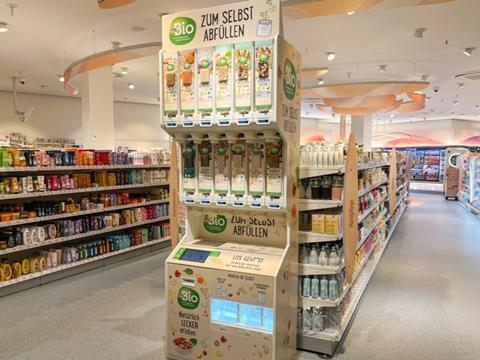
Czech company Miwa has supplied dm (drogerie markt) shops in Germany with modules aiming to minimize packaging waste for the chain’s loose food products such as pasta, rice, cereal and nuts.
During February and March 2024, Miwa refill stations will be opened in 15 dm shops in the German states of Lower Saxony, North Rhine-Westphalia and Hesse, where their pilot operation will take place. In all 15 shops, the Miwa modules contain 12 different food products in bio-quality, which customers can pour and digitally weigh via an automatic dispenser into reusable back-up containers. For dm, these will be the first products sold by weight.
At the same time, as part of the launch of this new service, dm has prepared a marketing campaign with information for customers in the selected regions including postcards, a newsletter, and information in the customer magazine, on the website or on Instagram.
Miwa says its solution, already used in several European retail chains, is based on reusable standardized capsules - circulating between shops, the service centre, and manufacturers - and on the maximum use of smart data. It claims one capsule saves almost 2,000 pieces of disposable packaging during its life cycle, and the system does not disturb retailers’ existing logistic and operational processes.
To use the system, there are reusable back-up containers available for customers to fill up, or they can bring their own containers, which need to be weighed on the module first to make sure customers are only paying for the weight of the selected product. The customers then select the desired product on the integrated display and gently push the container onto the dispenser.
According to Miwa, the container starts to fill, and the display shows the current weight and price of the product in the container. Finally, the module prints a price tag that the customers stick to the container and take to the checkout. The reusable back-up containers can be returned at dm shops or reused on the next purchase.
At the start of this year, TOMRA and the municipality of Aarhus in Denmark announced the ‘world’s first’ open-managed system for reusable takeaway packaging, a solution expected to help entire cities transition away from single-use packaging. The three-year project enables packaging from different food and drinks providers to be returned to a shared infrastructure of automated collection points throughout the city, which are accessible 24/7 and hope to incentivize high return rates by reimbursing the deposits paid by consumers when purchasing their products.
More recently, a report released by Root outlined the keys to hitting reuse and refill targets, highlighting the importance of understanding data, collaborating across the supply chain, transparency surrounding environmental benefits and an understanding of consumers’ needs as important areas.
If you liked this story, you might also enjoy:
The Brief: How viable is biorecycling for plastics?
Report: How the top brands are progressing on packaging sustainability
The Brief: Using ocean-bound plastic in packaging – how, why and should we?














No comments yet